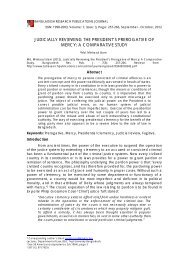john donne, a poet more of spirituality than of sensuality
john donne, a poet more of spirituality than of sensuality
john donne, a poet more of spirituality than of sensuality
Create successful ePaper yourself
Turn your PDF publications into a flip-book with our unique Google optimized e-Paper software.
John Donne, a PoetIn ‘Elegy XII: His Parting from Her’, Donne portrays the picture <strong>of</strong> a lover who is not in anykind <strong>of</strong> mechanical love but in real love. As a result, he has mutually enjoyed all the sighs,tears and fevers <strong>of</strong> love. This love challenges fortune saying;Rend us asunder, thou canst not divideOur bodies so, but that our souls are ty’d,And we can love by letters still and gifts,And thoughts and dreams; Love never wanteth shifts.Rejection <strong>of</strong> body is very special about this love where he says;Declare yourself base Fortunes enemy,No less by your contempt <strong>than</strong> constancy:That I may grow enamoured <strong>of</strong> your mind,When mind own thoughts I there reflected find.This increase <strong>of</strong> love is thought to be the victory <strong>of</strong> love against fortune. In the end hedeclares his constancy saying;Take therefore all in this: I love so true,As I will never look for less in you.So, here Donne praises <strong>spirituality</strong> under a wrapper <strong>of</strong> love that gives emphasis on sharingfeelings together, united souls and constancy <strong>of</strong> love. ‘Elegy: On His Mistresse’ is also apoem about the separation <strong>of</strong> two lovers who are afraid <strong>of</strong> the outer world. The lover,here, says to;Think it enough for me to have had thy love,Visibly it is a poem concerned about the lonely beloved and about preparing well beingfor beloved in absence <strong>of</strong> lover. But, Donne’s ‘Elegy: To His Mistresse Going To Bed’appears to be very frank in colloquial <strong>sensuality</strong> as it brings forth sexual language andinnuendoes;The foe <strong>of</strong>t-times having the foe in sight,Is tired with standing though they never fight.99This may have been the reason <strong>of</strong> this poem being banned from the 1633 edition. But itmust be noted that Donne assumes here, as elsewhere, that the language <strong>of</strong> sexual loveis not a special lovers’ language, rather, it includes any idea that comes to hand whethertaken from ordinary realities <strong>of</strong> daily life, or from wide range <strong>of</strong> his reading. Even in such apoem borrowed idea from the theology <strong>of</strong> Caluin is found. Caluin has argued that menare unable to win salvation through any merit <strong>of</strong> their own where a few get therighteousness or ‘grace’ <strong>of</strong> God or Jesus Christ as they are to be saved due to the‘imputed grace’ provided by the God. Here Donne suggests that no man can enjoy thecompany <strong>of</strong> woman but can only hope that the woman will impute to him her owninfinitely superior qualities and love him for them. Donne calls the activities <strong>of</strong> theprotagonist and the mistress as something where there is ‘no penance’ but ‘much lessinnocence’. Thus, the elegies clarify the spiritual ideas to bring morality before all in a verycomprehensive way.John Donne’s ‘Songs and Sonnets’ are product <strong>of</strong> different attitudes according to themood <strong>of</strong> the moment but in these poems Donne discovers his love philosophy to win overthe argument <strong>of</strong> superiority <strong>of</strong> body and soul in love. For, ‘The Flea’ the mood is certainly aromantic one though there is a logical trickery made by Donne. However the target forDonne’s trickery is audience if the dramatic situation, that <strong>of</strong> a man wining an argumentagainst a woman, is produced for the audience to find their own decision in this regard.Any debate competition can be won by pure and prolific logic but the ethical decision isthrown to every audience. It is surely the audience who is to take decision seeing thedebate. But, the mood in ‘The Good Morrow’ is for one newly in love who rejoices as thehttp://www.bdresearchpublications.com/journal/
















